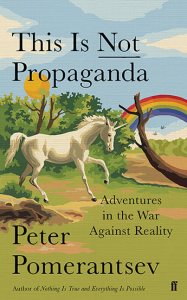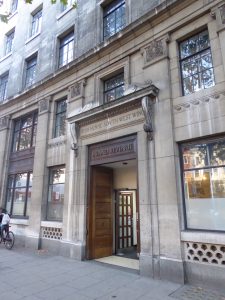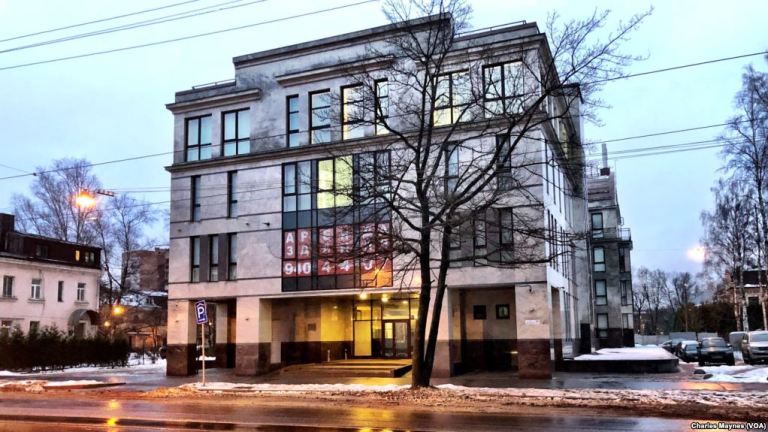From Woburn to the St. Petersburg troll factory
Reading Peter Pomerantsev’s new book This is Not Propaganda, Guy Woodward finds echoes of PWE’s wartime activities in contemporary disinformation campaigns
Having spent nearly a decade working as a producer in the super-charged dystopian world of Russian television, by 2010 Peter Pomerantsev was exhausted. He left a country ‘where spectacle had pushed out sense, which left gut feeling as the only means of finding one’s way through the fog of disinformation’, and returned to London, where he is now Senior Fellow at the Institute of Global Affairs at the London School of Economics and develops plans to combat information manipulation.[1]

Part family memoir, part travelogue, his new book, This Is Not Propaganda: Adventures in the War Against Reality examines contemporary information warfare across the world: Pomerantsev reports from the Philippines, Serbia, Mexico, Syria and China, and focuses at length on Russia and Ukraine.
Born in 1977 in Kyiv, Pomerantsev left the Soviet Union with his parents in 1978, after his dissident father had been detained and interrogated by the KGB on charges of circulating ‘anti-Soviet fabrications of a defamatory nature’.[2] Igor Pomerantsev had distributed copies of banned books by Russian authors including Vladimir Nabokov and Aleksandr Solzhenitsyn. He subsequently found work at the BBC World Service, one of the stations he had listened to in secret in Soviet Ukraine. His son describes visiting the ‘wondrous island’ of Bush House as a child in the 1980s:
As soon as my father was locked in the aquarium-like glass case of the broadcasting studio, I was free to roam every floor. Down the wide stairs I went, around me every colour and ethnicity the world knows, all speaking, shouting English, but with different accents. All typing, smoking, sprinting between slamming doors to break the latest news. Every section of the vast building was another country or even continent.

Forty years prior to this, the vast building on the Strand served as London base of the Political Warfare Executive, which shared Bush House with the BBC: in his recent history of the corporation at war, Edward Stourton writes that ‘One lift in the building led to a world where truth was king, another to a world dedicated to deception and treachery.’[3] This Is Not Propaganda has almost nothing to say about the Second World War, but Pomerantsev’s investigations nevertheless suggest some intriguing echoes of the wartime activities of the PWE in today’s highly-networked disinformation campaigns.
In the book’s first chapter ‘Cities of Trolls’ for example, Pomerantsev interviews the Russian journalist Lyudmilla Savchuk, who infiltrated a troll farm in St Petersburg and revealed its inner workings. Savchuk was assigned a ‘special project’ involving the creation of an online personality known as ‘Cantadora’, a mystic healer and ‘expert in astrology, parapsychology and crystals’. Cantadora was designed to appeal to middle-class women with little interest in politics, and Savchuk’s job was ‘to drop in the odd bit of current affairs in between blog entries on star signs and romance.’[4]

This resembles the strategy pursued by the clandestine radio stations run by PWE during the Second World War, such as Soldatensender Calais (1943-45), devised by Sefton Delmer at PWE’s ‘Country’ HQ at Woburn Abbey, Bedfordshire, and intended to resemble a genuine German station. Actor and singer Agnes Bernelle – who played the announcer Vicky on the station – recalled that the main attraction for German military listeners was the broadcast of jazz music, forbidden in Germany as ‘alien and decadent’. Between records, however, Bernelle would read ‘items of news and other subtly disguised pieces of propaganda’, so that the Germans ‘would invariably get the information we wanted them to have.’[5] Like the St Petersburg trolls, the PWE also weaponised astrology for the purposes of propaganda: Delmer describes the production of Zenith, a fake astrological magazine which featured ‘horoscopes for Germany’s leaders’ and ‘prognostications for U-boats and aircraft according to the date and hour of their launching and sortie’.[6]
Pomerantsev is particularly struck by the granular detail of some contemporary campaigns: ‘Two trolls would go on the comments section of small, provincial newspapers and start chatting about the street they lived in, the weather, then casually recommend a piece about the nefarious West attacking Russia.’[7] Several PWE campaigns likewise drew on detailed local knowledge: John Baker White recalls studying aerial photographs of bomb damage so that covert broadcasts could refer accurately to the destruction of individual properties, providing news which the German authorities were keen to keep secret.[8] Ewan Butler, meanwhile, describes spreading a rumour in Germany about the admission to hospital of a Gauleiter’s mother-in-law, as a means of showing how regional Nazi officials were obtaining preferential treatment.[9]
Pomerantsev also visits the London-based Institute for Strategic Dialogue (ISD), which researches and formulates campaigns against extremism. Here he learns about guides posted by anonymous agitators on sites including 4chan and Reddit which offer a ‘crash course in online persuasion’ and provide ‘advice on how to use the values of your enemy against them’:
So if you are attacking a leftist politician, you should create a fake liberal persona for yourself online and point out how politicians are part of the financial elite, or how their ‘white privilege’ has allowed them to rise to the top and avoid arrest.[10]
Seven decades earlier, Delmer’s clandestine radio station Gustav Siegfried Eins (GS1) began broadcasting to Germany on 23 May 1941.[11] GS1 carried furious diatribes by the invented character ‘der Chef’ (‘The Boss’) – a title by which Delmer had heard members of Hitler’s entourage refer to their leader, although this der Chef was hostile to the Nazi Party. A veteran Prussian officer, the intensely patriotic character ranted for two years against the weakness, incompetence and venality of Nazis who were letting down the proud German nation: in broadcasting these sentiments Delmer hoped to drive a wedge between the German people and their leaders.
There’s no evidence that any of the contemporary practitioners of online disinformation and subversion were directly influenced by the PWE’s campaigns, but it is striking and troubling to see similar tactics at work. A clear distinction can be drawn, however, between the PWE’s aim of bringing the war to a swifter conclusion by contributing to the defeat of the Axis regimes, and the desire on the part of Pomerantsev’s subjects to prosecute a multidimensional, ever-shifting and perpetual form of information warfare. In eastern Ukraine he reflects that whereas war had previously involved ‘capturing territory and planting flags […] something different was at play out here’:
Moscow needed to create a narrative about how pro-democracy revolutions like the Maidan led to chaos and civil war. Kiev needed to show that separatism leads to misery. What actually happened on the ground was almost irrelevant; the two governments just needed enough footage to back their respective stories. Propaganda has always accompanied war, usually as a handmaiden to the actual fighting. But the information age means that this equation has been flipped: military operations are now handmaidens to the more important information effect.[12]
Peter Pomerantsev is appearing at the Durham Book Festival on Sunday 6 October 2019
Notes
[1] Peter Pomerantsev, This Is Not Propaganda: Adventures in the War Against Reality (Faber and Faber, 2019), p. 218. Pomerantsev describes his experiences in Moscow in the 2000s in Nothing is True and Everything is Possible (2015).
[2] Pomerantsev, This Is Not Propaganda, p. 55.
[3] Edward Stourton, Auntie’s War: The BBC During the Second World War (London: Penguin, 2018), p. 353. Although the PWE was certainly responsible for producing covert or ‘black’ propaganda, it should be acknowledged that many of the campaigns of ‘deception and treachery’ originated from the organisation’s ‘Country’ headquarters at Woburn, Bedfordshire.
[4] Pomerantsev, This Is Not Propaganda, pp. 35-6.
[5] Agnes Bernelle, The Fun Palace (Dublin: Lilliput Press, 1996), p. 94.
[6] Sefton Delmer, Black Boomerang:An Autobiography: Volume Two (London: Secker & Warburg, 1962), p. 132.
[7] Pomerantsev, This Is Not Propaganda, p. 36.
[8] John Baker White, The Big Lie (London: Evans Brothers, 1955), p. 67.
[9] Ewan Butler, Amateur Agent (London: George G. Harrap, 1963), p. 166.
[10] Pomerantsev, This Is Not Propaganda, p. 203.
[11] Ellic Howe, The Black Game: British Subversive Operations Against the Germans During the Second World War (London: Queen Anne/Futura, 1988), p.106.
[12] Pomerantsev, This Is Not Propaganda, p. 140.
